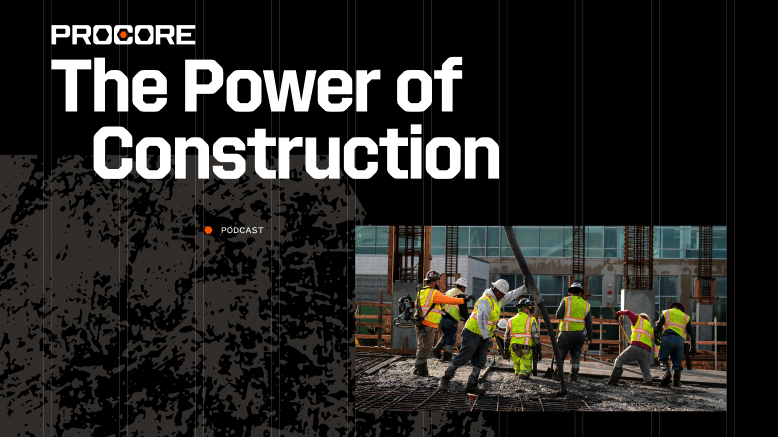— 9 min read
Bid or No Bid? How Contractors Should Choose Their Project Bids


Last Updated Oct 3, 2025

Ben Ashburn
Staff Trainer & Program Manager
22 articles
Ben Ashburn is a Senior Construction Education Trainer at Procore. After a successful career as a construction estimator — working his way up from estimating manager to senior estimator — Ben has spent the most recent part of his career in construction sharing his skills with other as a construction educator. Ben has an extensive background in construction education: He has been an assistant professor in the Department of Construction Science at Texas A&M, and lectured about estimating, scheduling, management, and other related construction topics at Murray State University. He has been a construction training and learning development partner with Procore since 2019.

Kacie Goff
Contributing Writer
93 articles
Kacie Goff is a construction writer who grew up in a construction family — her dad owned a concrete company. Over the last decade, she’s blended that experience with her writing expertise to create content for the Construction Progress Coalition, Newsweek, CNET, and others. She founded and runs her own agency, Jot Content, from her home in Ventura, California.
Last Updated Oct 3, 2025

Deciding whether to submit a bid for a construction project is a significant decision for contractors. If they don't bid on enough projects, they risk having less work and lower earnings. However, bidding on the wrong project or too many projects at once can lead to complications and potentially harm the company.
What constitutes the "right" project varies for each contractor. Factors such as location, project type, available resources, and other details play a key role in deciding whether to get involved.
This article looks into the many factors a contractor should consider in making the bid/no bid decision and the risks of either side.
Table of contents
Understanding the Bidding Process
The construction bidding process is the phase when owners to decide which contractor to hire for a new construction project. A bid to undertake a construction project involves the owner asking several contractors to submit a proposal to build the project, usually through a request for proposal (RFP), and estimate how much money it would cost the owner to do it.
The bidding process must consider a lot of different factors, and getting good at it could mean the difference between business success or business failure. Bidding for a construction project is highly competitive – contractors have to demonstrate their understanding of the project and ability to complete it, and yet often the project will go to the contractor with the lowest estimated cost projection.
Getting it all right takes a lot of time and preparation. Selected contractors receive a bid package from the owner that includes plans and specs for the project. They lean on industry partners like materials suppliers and subcontractors to come up with costs for completing the project, consider site conditions, weather and timing implications of completing the work, and as many other factors as they can to get an accurate cost to submit to the owner.
The Risk of Bidding vs. Not Bidding
New contracting companies may feel pressure to bid on every project available to them, understanding the risks of not having enough work to do. However, the risk of bidding on the wrong project can be just as threatening to a business’ viability. Likewise, overcommitting to too many projects at once can lead to strained resources and financial ruin. Striking the right balance is an essential skill for any contracting business.
Any contractor who isn’t sure about how to find this balance should seek help from other people in the company, ask more questions about the scope or requirements of the project and get more data from trade and industry partners to ensure there is enough information to make the best decision possible. All construction projects involve some level of risk, so it’s just about managing an acceptable level of risk for each one.
When Not to Bid on a Construction Project
Many of the factors involved in deciding whether to bid or not bid will become more obvious and intuitive to contracting firms over time and experience. As each project goes by, construction professionals get a greater sense of what a project will take and whether the timing of a project is right for their teams.
The factors involved in making the bid decision fall loosely into the categories below.
Business Goals and Specialties
With experience, contractors get a better understanding of the types of projects they do best. Contractors who have done a lot of work building schools and hospitals will find a niche in that market, understanding the ins and outs of those projects better than other contractors.
Companies need a clear sense of their capabilities and which types of projects will help them grow toward their goals. Suppose the above company got the opportunity to bid on a manufacturing plant. In that case, they may decide not to leap that far out of their realm of expertise unless diversifying into a different area fits into the overall company strategy for growth.
For established companies, having a well-defined market niche helps them avoid taking on projects that are beyond their expertise or logistical capacity. If a contractor has a robust presence in healthcare construction and office buildings but receives an opportunity to bid on a data center, it may be wise to pass on it unless there’s a strategic reason to diversify.
Owner’s Reputation
The reputation of potential project owners can heavily influence the decision. GCs often avoid owners known for slow payments, difficult project requirements, or other problematic behaviors. It could be a reputation for being a slow payer, being extremely difficult to please or having stringent requirements to meet that would take a lot of extra work and administrative time.
A challenging owner or one with a history of delayed payments can cause cash flow issues and unnecessary stress. These red flags can be identified through industry networks, past experiences and interaction with other contractors who have worked with the owner before.
Even if the contractor and owner have no past experience, the bid package alone can sometimes dissuade the contractor from bidding on a project. If the owner seems to need a lot of personal maintenance or builds a lot of hoops for contractors to jump through, the contractor may decide it looks like too much trouble to bid.
The involvement of a specific architect can also make a project distasteful for a contractor if the architect has proven to be difficult or uncommunicative in the past. If the contracting team decides to go for that bid, they may include a price bump as a contingency for the extra trouble they expect.
Too Much Competition
Most construction project bids are highly competitive, but if there are too many other contractors set to bid on a project, the contractor may decide to sit it out. Bids involve a lot of time and effort. If there are too many competitors, the chance of winning may just be too slim to bother.
Having a lot of competition may also mean undercutting prices and cutting into profit margins enough to make the project not worthwhile. After participating in the construction market for some time, contractors develop a good sense of whether or not they’re likely to win project bids. The chances depend in part on their ability to spend a lot of time and focus on getting the bid just right. If there’s a project that looks especially enticing or that will benefit the company a great deal, the best strategy may be to prioritize that bid over others.
If there’s a risk of committing to too many projects at once, contractors may make up for the risk by bidding higher on some less critical projects, so that if they win them there will be some extra profit incentive to make the effort worthwhile.
Location
Construction projects that are outside of a contractor’s usual working locale are riskier to undertake. Contractors have a network of known and trusted specialty contractors, and tend to work with them on repeat occasions. On projects outside the usual working area, contractors would have to either pay the subcontractors to work away from home, or vet a whole new set of subs closer to the project’s location.
While vetting new trade partners can be risky and time consuming, bringing a labor force to a new area can drive costs far higher, making the project ultimately less financially viable.
Project Scope and Requirements
When contractors submit bids, they attempt to balance the cost to the owner with the ability to maintain a healthy profit margin on the project. Projects that appear to have too many requirements or too broad a project scope may make it more difficult for the contractor to make a profit.
Unclear or overly demanding specifications can make contractors think twice about bidding on projects because they worry about their ability to successfully meet those objectives.
For example, to work with the Army Corps of Engineers, contractors have to submit a lot of paperwork that involves a lot more administrative hassle. A lot of companies would decide that extra hassle is not worth the benefits that the project may offer.
Additional Bidding Considerations
Deciding whether to bid on a construction project can involve more than evaluating business goals, project scope and the reputation of project owners. Contractors may likely also consider several other factors that can significantly influence their decision.
Communication Styles
The key to bidding well is to gain a really good understanding of the project scope and get quality input from industry partners, both of which rely heavily on open communication and collaboration. Conversely, a lack of communication can lead to misunderstandings and rework, which increase costs and cause delays.
Building and maintaining good relationships through active information sharing reduces project risks and builds a lot of goodwill that can help when things inevitably change on the project.
The Human Touch
Technology has streamlined some aspects of the bidding process, like making initial contacts and pre-qualifications easier. Still, success in bidding comes mostly down to the more human elements of relationships and trust.
Successful projects require wrangling teams of specialists in their fields, all of whom have their own methods, timelines, and ways of doing things, and who are all trying to make money through their involvement. In-person interactions are the best way to become familiar with industry partners to ensure they are capable of delivering the project well and on time.
Finding New Opportunities
Contractors will find more opportunities and get a better sense of upcoming projects by reaching out and becoming more active members of their local construction communities. Making a practice of talking with owners and architects and getting early information on projects can be a great way to deepen industry relationships and get a better sense of the local construction environment.
To Bid or Not to Bid
The decision to bid or not to bid requires a great deal of consideration. Overcommitting project teams by bidding on too many projects can risk the quality of the work and the financial health of the company, while bidding on too few can strangle any hopes of growth and success.
Newer contractors often err on the side of bidding on projects when they really shouldn’t, either because they need more work on the roster or because they don’t have an established process for making the bid/no bid decision yet.
Striking the right balance on when to bid requires experience and maturity, and a firm grasp on the company’s future goals. Considering the scope, location, stakeholders and type of build involved in a new project, a contracting firm can build a successful process for deciding when to bid or not to bid on upcoming projects.
Prove your project management software is profitable.
See Procore and Dodge Data & Analytics' 2025 Dodge ROI Report deep dive.

Was this article helpful?
Thank you for your submission.
67%
33%
You voted that this article was . Was this a mistake? If so, change your vote
Scroll less, learn more about construction.
Subscribe to The Blueprint, Procore’s construction newsletter, to get content from industry experts delivered straight to your inbox.
By clicking this button, you agree to our Privacy Notice and Terms of Service.
Thank you!
You’re signed up to receive The Blueprint newsletter from Procore. You can unsubscribe at any time.
Categories:
Written by

Ben Ashburn
Staff Trainer & Program Manager | Procore Technologies
22 articles
Ben Ashburn is a Senior Construction Education Trainer at Procore. After a successful career as a construction estimator — working his way up from estimating manager to senior estimator — Ben has spent the most recent part of his career in construction sharing his skills with other as a construction educator. Ben has an extensive background in construction education: He has been an assistant professor in the Department of Construction Science at Texas A&M, and lectured about estimating, scheduling, management, and other related construction topics at Murray State University. He has been a construction training and learning development partner with Procore since 2019.
View profile
Kacie Goff
Contributing Writer | Procore Technologies
93 articles
Kacie Goff is a construction writer who grew up in a construction family — her dad owned a concrete company. Over the last decade, she’s blended that experience with her writing expertise to create content for the Construction Progress Coalition, Newsweek, CNET, and others. She founded and runs her own agency, Jot Content, from her home in Ventura, California.
View profileExplore more helpful resources

What Happens When Data Drives the Business?
Construction has long been seen as a low-margin industry. But what if the real problem isn’t the margins—it’s how decisions get made? In episode 17 of The Power of Construction,...

Vet Contractors with Confidence: A Guide to Smart Bidder Selection
Selecting the right bidder is one of the most consequential decisions a construction team makes — yet it often happens under tight deadlines, with limited visibility into the long-term implications....

The Construction Bid Interview & Follow-up: Closing the Deal
During construction project bidding, the interview is often the last part of the request for proposal (RFP) process and one of the most influential. For teams that advance to the...
Construction Business Development: Tracking and Winning the Right Opportunities
Construction business development isn’t just a response to deadlines: It’s a long-term strategy rooted in focus, visibility and timing. Delays, funding gaps and market pressure have made it harder to...
Free Tools
Calculators
Use our calculators to estimate the cost of construction materials for your next project.
Templates
Find a template to help you with your construction project tasks.
Material Price Tracker
Get the latest U.S. retail prices and view historical trends for common building materials.
Glossary
Explore key terms and phrases used in the industry.
